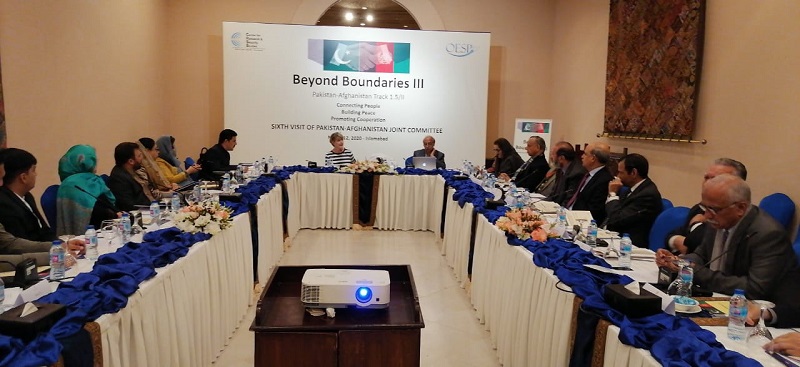By Hamid Khan Wazir
ISLAMABAD, Pakistan: Moderator Kathy Gannon, Pakistan-Afghanistan Expert and Senior Journalist at Associated Press, has said that Pakistan has been extending an olive branch to Kabul for long, but Afghans look at it with sheer suspicion.
Speaking at the sixth meeting of Pakistan-Afghanistan Joint Committee Member (PAJC) – under the Centre for Research and Security Studies’ (CRSS) Pakistan-Afghanistan Track 1.5/II initiate – Beyond Boundaries, here on Thursday, Gannon said that Afghanistan often first asked Pakistan to get involved in the peace process, but the moment Pakistan jumped in, Afghan government gets upset with it and this contradictory approach needs to be decoded.
On the other side, sometimes Pakistan’s interests are being threatened from the Afghan soil. So, amid all this, people to people contact is of sheer importance and forums like this help in clearing such notions.
The meeting was structured for discussion around the dynamics of intra-Afghan dialogue, the fears regarding the future of Afghanistan in the wake of possible new set-up post-intra-Afghan talks, regional interests attached to the Afghan peace process, the future of Afghanistan’s economic viability, Pak-Afghan bilateral relations, people to people contacts, along with other important factors that comes into the equation. The meeting was attended by the influentials on both sides, including senior parliamentarians, former ambassadors, ex-military officials and experts on the subject matter.
With the signing of US-Taliban peace deal and recent election fiasco in Afghanistan – two rival Presidents swearing-in at the same time – there are fears over the sustainability of the peace deal and concerns over its long-term consequences. This prompts cautious optimism and wary cynicism, in particular considering that the next step – an intra-Afghan dialogue – will be a bumpy road to ride through.
Delegates from both sides shared the view that first and foremost, without the internal impetus to change the existing state of affairs within Afghanistan cannot go forward. External pressures can only go so far – signing of the peace deal and offering a window of opportunity in facilitating upcoming intra-Afghan dialogue. It is also the test of the Afghan leadership to rise above their personal power struggles and fragile egos, for the better future of the Afghan nation. In such countries, where there is cultural diversity and ethnic division, it is the wisdom of leadership that steers the nation towards a common ground.
Delegates from the Afghan side included: Muzammil Shinwari, former Deputy Trade, and Commerce Minister; Saleem Khan Kunduzi, former Governor Nangarhar; Fouzia Koofi, former Member of Afghan Parliament; Momina Yari, former Commissioner, Independent Election Commission of Afghanistan and Waris Hasrat, Senior Journalist ATN. From Pakistan side, Mehnaz Akber Aziz, Member of Parliament; Dr. Shoaib Suddle, former IG Police; Maj Gen (retd) Athar Abbas, former DG ISPR; Lt Gen (retd) Asif Yasin Malik, former Defense Secretary; Maj Gen (retd) Masood Aslam former Ambassadors Muhammad Sadiq, Ayaz Wazir, Abrar Hussain, Asif Durrani, Qazi Humayun; Ammara Durrani, development professional, and public policy expert; Haroon Sharif, a well-known global expert of economic policy; Hasan Khan, Senior Journalist at Khyber News and Vice Admiral Khan Hasham Bin Saddique, President IPRI joined the discussion.
Islamabad should be viewed as a connector rather than a destabilizer.
Regarding Pakistan’s role vis-à-vis peace process, it was discussed and emphasized that it is the key stakeholder in the Afghan peace process. Islamabad should be viewed as a connector rather than a destabilizer. The world is also acknowledging Pakistan’s positive role in bringing the Taliban to table talks. Further, the delegates from both sides agreed that Islamabad should continue its facilitation regarding the Afghan peace process till the end, by utilizing whatever influence it has over elements within the Afghan Taliban, without becoming a party to it.
Pakistani delegates agreed to the notion along with reminding their counterparts that the Taliban were never Islamabad’s friends and the notion that the Taliban would be pro-Pakistan if they manage to be part of the government is blown out of proportion. Except for diplomatic niceties, Pakistan got no advantage from the Taliban regime in the past. The world needs to understand that Islamabad does not possess a joy-stick to set the direction of the Taliban’s trajectory. It just enjoys a certain amount of goodwill, which is already being used to facilitate the peace process, Pakistani delegates added.
With respect to conflicting external stakeholders, it was suggested that conflicting geopolitical interests of different stakeholders must be rectified to attain sustainable peace. It must be taken into account that there are certain interest groups that want to preserve the uncertainty and instability, in order to safeguard their own interests in an economy defined by war and conflict of over four decades. Though, participants highlighted that without internal spoilers, external ones cannot do much. So, both the countries need to look inwards first for the spoilers.
Towards the conclusion of the meeting, both sides jointly drafted recommendations for improving Pak-Afghan bilateral ties, to be shared with both the governments and other relevant stakeholders. Some of the joint recommendations include: both governments should resume the discussion on the process of APAPPS; both governments should jumpstart the process of bilateral negotiations for renewing existing APTTA and PTA; establishment of Pakistan-Afghanistan Parliamentary Caucus; establishment of Pakistan-Afghanistan Youth Caucus, encouraging media partnership and so on.




